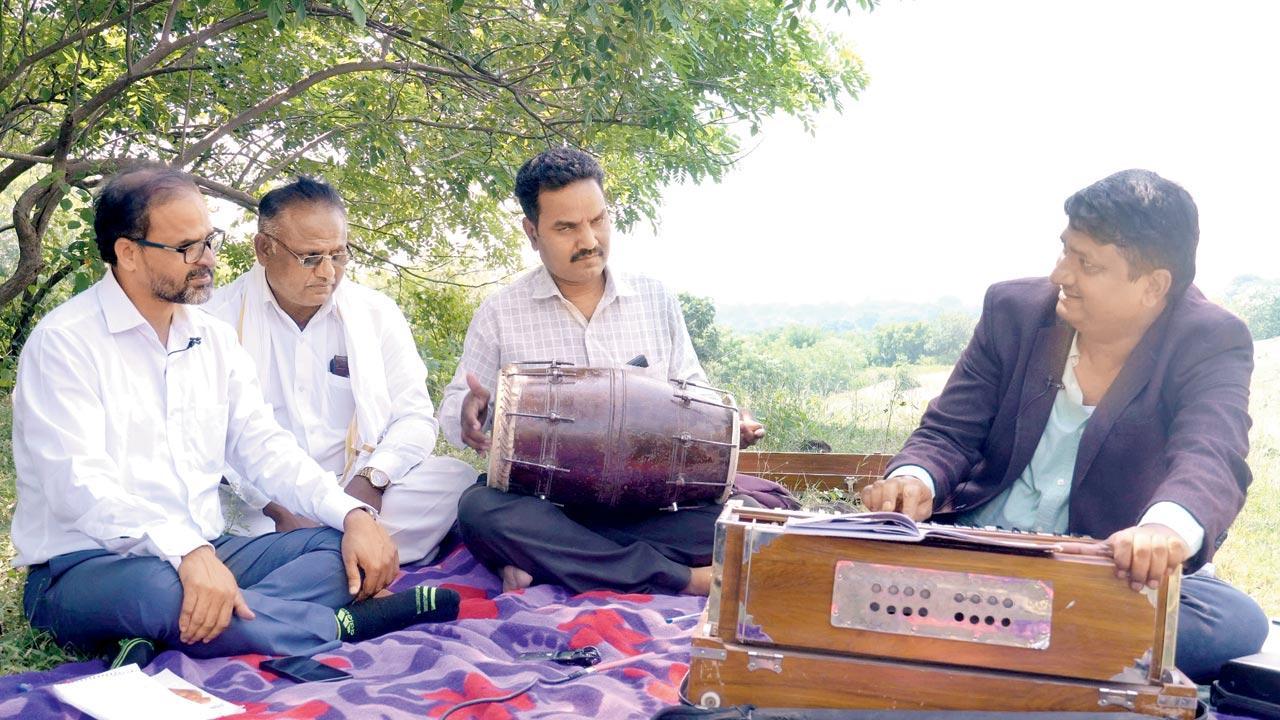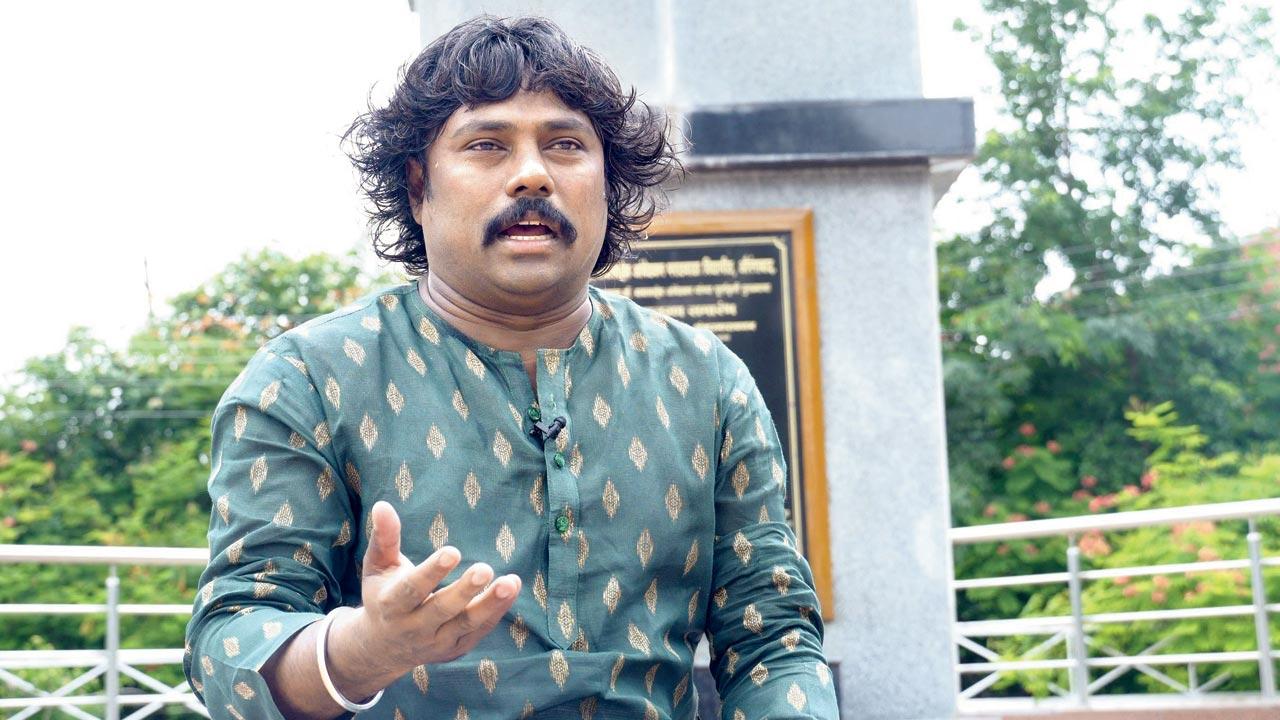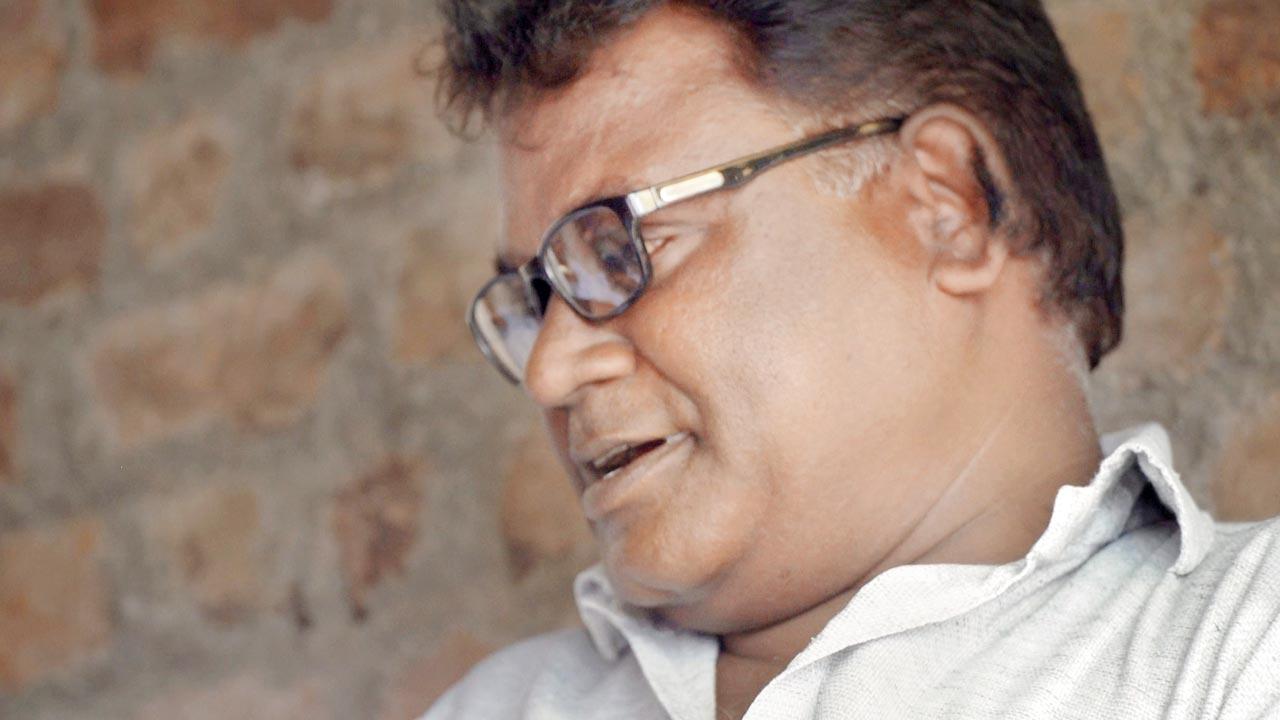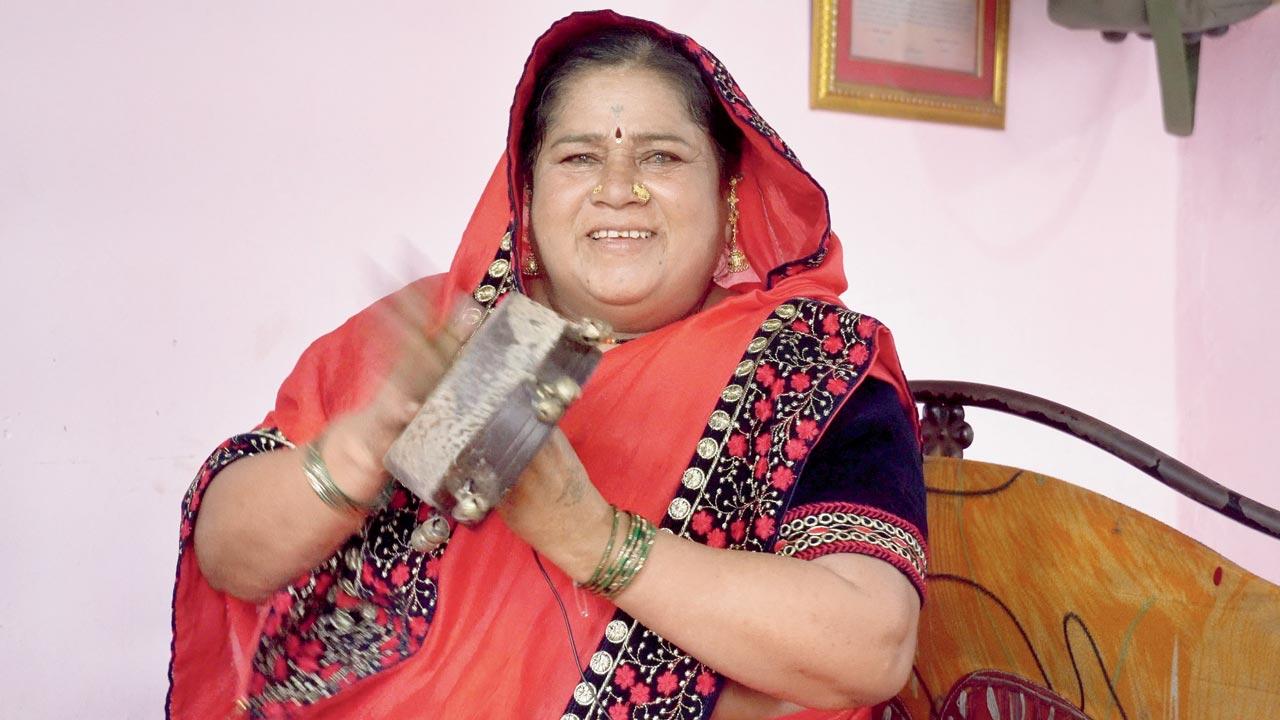A scholar from the drought-prone region draws attention to eight shahirs known for their strong anti-caste voices and a musical legacy nearing extinction

Scholar-writer Keshav Waghmare (extreme left) listens to shahir Rahul Anvikar, who is seen playing the harmonium
![]() The Marathwada region is annually in the news for two reasons, both unfortunate—drought or floods. This year it was the latter. Four key districts of the usually drought-prone geography suffered immense crop damage due to excessive downpour in the retreating monsoon months. While the agrarian crisis consumed news space, a niche piece of information introduced this columnist to a distinct whiff from Marathwada. The India Foundation For The Arts (IFA) hosted a talk by scholar-writer and Pune resident Keshav Waghmare, who hails from a village in the Beed district of Marathwada. Waghmare spoke of eight shahirs (poets) of Marathwada, who have nurtured their musical tradition as a tool to create political consciousness.
The Marathwada region is annually in the news for two reasons, both unfortunate—drought or floods. This year it was the latter. Four key districts of the usually drought-prone geography suffered immense crop damage due to excessive downpour in the retreating monsoon months. While the agrarian crisis consumed news space, a niche piece of information introduced this columnist to a distinct whiff from Marathwada. The India Foundation For The Arts (IFA) hosted a talk by scholar-writer and Pune resident Keshav Waghmare, who hails from a village in the Beed district of Marathwada. Waghmare spoke of eight shahirs (poets) of Marathwada, who have nurtured their musical tradition as a tool to create political consciousness.
Waghmare has been in touch with these poets since 2017, which is much before he availed the IFA grant for studying the genesis of shahiri—etymologically rooted in the Farsi ‘shayar’ and embraced in Marathi ethos since Chhatrapati Shivaji Maharaj’s times—particularly focusing on eight shahirs’ contribution in contemporary Marathwada. As he started interviewing the eight songmakers, the pandemic and COVID protocols took charge of the life of his subjects. He continued to intermittently collate their verse for a video archive. A book on the eight shahirs is currently in the pipeline, with a mid-2023 deadline, but the video documentation of the eight voices—one shahir, Atmaram Salve, is no more—is proving to be a harder task.
 Meghanand Jadhav’s songs express his dissatisfaction with the current socio-political environment
Meghanand Jadhav’s songs express his dissatisfaction with the current socio-political environment
Unfortunately, the shahirs have had very few live performances in the post-pandemic world, which is why catching them in action is becoming a rarity. These poets have electrified many litfests, political jamborees and Ambedkar Jalsas, but most of the past glorious moments are not archived. At one point, Babasaheb Ambedkar praised shahir Bhimrao Kardak’s crowd pulling power stating that “10 of his public meetings equalled one Jalsa by Bhimrao Kardak!” It is another story that the oratory and art of neither Kardak nor other greats is preserved in an online film archive.
“These artistes have a formidable body of work, but they are not aware of its magnitude and expanse. Many verses, which have become anthems for social movements, are scribbled notes kept under pillows by these authors,” says Waghmare, who will soon showcase these eight voices in a conference titled Facing History and Ourselves Revisiting Archives and Museums in the 21st Century in Kolkata. The shahirs’ voices are crucial in the context of forgotten histories of common people, like the Dalit minorities of Marathwada, which are often excluded in majoritarian mainstream narratives. “These voices have played historical roles, as early as the 17th century, when the Swarajya concept was articulated by shahirs, and also when Mahatma Phule took to powadas [a genre of Marathi poetry] for his efforts to propagate equality of sexes. Even post 1920s, when Ambedkar’s radical thought travelled in the form of signature songs.”
 Parbhani resident Gangadhar Pol sings in Hindi to warn against turbulent times
Parbhani resident Gangadhar Pol sings in Hindi to warn against turbulent times
The lawyer-lobbyist for Marathwada’s body of poets, Waghmare, provided a prism to this columnist to look at the power of words—simple everyday turn of phrases, pedestrian usages, quiet appeals—that inspire the dispossessed to take on mighty forces. Gangadhar Pol, 50, from Parbhani takes to Hindi to warn against turbulent times: “Is desh ko bachao tabahi ke pahile/ Itihas naya likh do hifajat ke pahile (Save the country before it is destroyed/ Rewrite the annals of history, even before you preserve its edifice).” Meghanand Jadhav, 41, the bard from Gangapur, expresses his dissatisfaction about the times in harsher terms: “Bharata Bharata tu kashacha mahaan re/ Tuzhyach ghatanakaracha hoto ithe apman re (Hey Bharat The Great? Great in what way?/ Great, despite the insults heaped on the maker of your country’s Constitution).”
In fact, all eight shahirs, even those hailing from Dalit sub-castes which have had reservations about Babasaheb Ambedkar’s leadership, as Waghmare’s study points out, owe their allegiance to Ambedkar’s belief in democracy and rule of law. Despite the special odds stacked against individual shahirs, they draw their collective strength from the Ambedkarite philosophy.
 Mira Umap, 70, who hails from the Matang community of Beed, is known for her immaculate hold over the khanjiri, a small percussive instrument usually played by men. Pics/Vikas Sontate
Mira Umap, 70, who hails from the Matang community of Beed, is known for her immaculate hold over the khanjiri, a small percussive instrument usually played by men. Pics/Vikas Sontate
Dadu Salve, 75, the visually challenged poet-performer from Aurangabad, now living in Ahmednagar, declares: “Kunachya raga lobhachi na amhala tama kahi/ kharyastav aaj patkarla tayancha rosh Bhimraya (We haven’t paid much heed to the opinions of others/ but we have borne the brunt of the rulers, O Bhimrao, in our fight for truth).”
Waghmare cites Gangadhar Pol as an even more striking instance of a Matang caste shahir singing paens to Ambedkar’s greatness. Pol, born to a Potraj (folk artist) in Parbhani, was meant to inherit his father’s struggles. It was almost decided that one day he would also customarily whip himself to invoke the local deity. But Pol’s mother upturned the script by pushing him in elementary school, which opened the doors for other life learnings. Pol eventually founded the social movement Manavi Hakka Abhiyan, in which he spelled out Ambedkar’s high ideals of democracy. It is rewarding to note that his poetry of universal brotherhood denounces narrow divisions like those seen between the Mahar and Matang castes. His verse stems from his respect for Ambedkar and shahir Annabhau Sathe.
Pol’s verse gained its edge because of the timely appreciation from veteran shahirs like Vamandada Kardak and Eknath Avhad. “Despite being surrounded by anti-Ambedkar voices in his Matang caste, Pol did not iterate the narrow theories. He realised that anti-caste wars cannot be fought while holding narrow parochial grudges against global leaders,” Waghmare adds. Pol’s poetry became a poignant vehicle of thought during the momentous Namantar Movement—granting Dr Ambedkar’s name to the Marathwada university—in the 1990s.
While most shahirs’ trajectories involve long struggles for social causes, the women shahirs’ lives are stacked against special sets of odds. Mira Umap, known for her immaculate hold over the khanjiri, a small percussive instrument usually played by men, has a reverberating roaring voice. Umap, 70, has been singing—acting skills also praiseworthy—since age ten. Hailing from the Matang community of Beed, Umap expressed her wish to sing a bharud (poetic form used by saint poets), when she accidentally heard an august gathering of kirtankars. While her father stopped her from approaching the upper caste singers, she rushed to the stage, sang with confidence, and won the hearts of the audience, which included Saint Tukdoji Maharaj. The Warkari saint gifted her a khanjiri, which accompanies Umap over the years. Her poetry has created awareness for several causes, including gender justice. She also speaks against social ills like dowry and drug abuse. Umap, who was without a home for years, has never stopped her public events, except during COVID times when her accommodation in Aurangabad turned to ashes due to a short-circuit. This was when she had to literally burn her trophies to generate fuel to cook during the lockdown. Of course, Umap’s defining high-pitch voice hasn’t been silenced by adversity. She says she wants to die singing Bhim Geets.
Same is the determination of Kadubai, 65, who, in jest, says she has “overcome” her name Kadu (bitter) in dealing with penury. The shahir from Jalna, married at 16 and widowed soon after, took to the iktari as a form of door-to-door bhajan service in search of two square meals a day. She wandered with her three children around Jalna and later moved to Aurangabad, because devotional kirtans were not a strong source of sustenance. Ultimately, she took to singing Ambedkar’s philosophy; songs on compassion and universal brotherhood. She found her niche in this transition. Over the years, she has retained the simplicity of her rendering, a trademark that she doesn’t shun even when called for jazzed up TV shows and live contests. “Bhimgeets are a power by themselves, they don’t need to be hyped in any way,” she responded, when a TV channel expressed an objection to her no-frills iktari.
Each shahir of Marathwada presents a life record, a story worth revisiting. Each voice has a fan following. These shahirs deserve a slot in the archive and museum. They are rich lived histories, relevant not just to Marathwada, but to a wider diverse audience that cares for a porous world.
Sumedha Raikar-Mhatre is a culture columnist in search of the sub-text. You can reach her at sumedha.raikar@mid-day.com
 Subscribe today by clicking the link and stay updated with the latest news!" Click here!
Subscribe today by clicking the link and stay updated with the latest news!" Click here!








